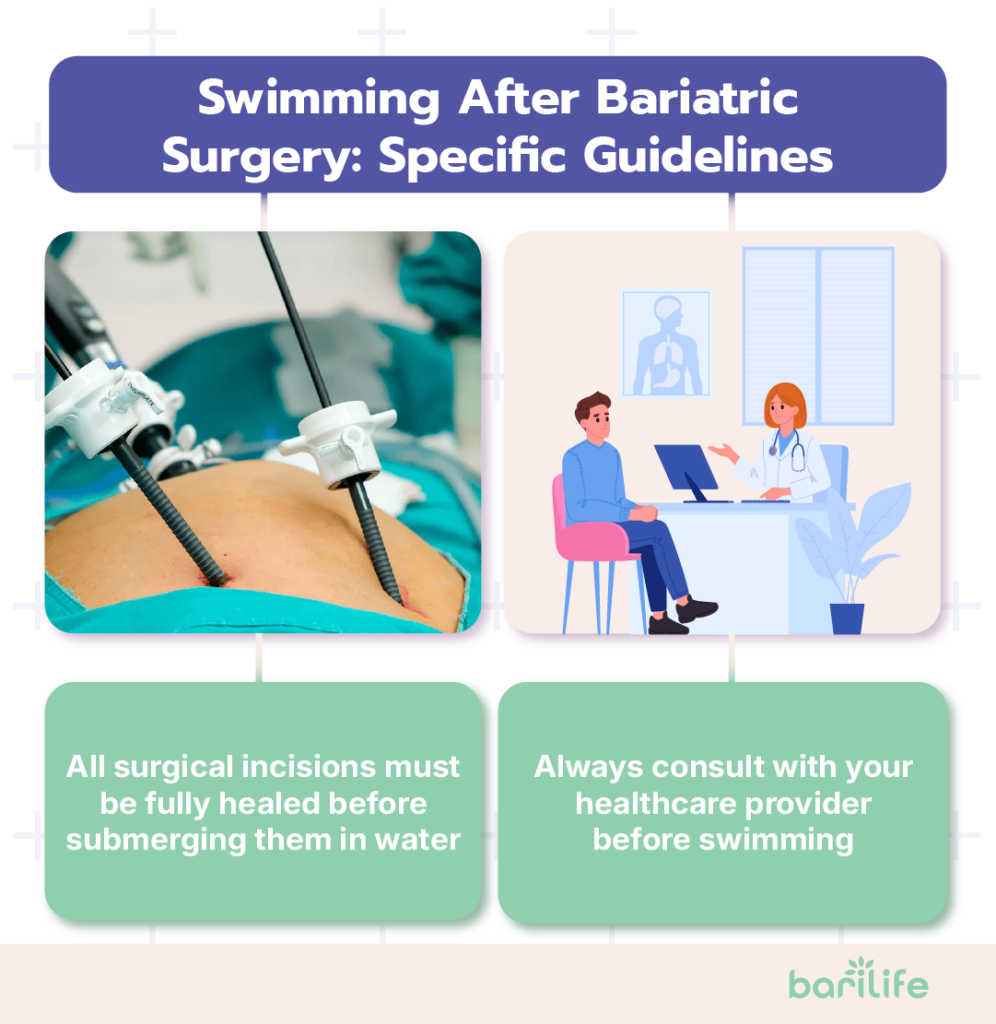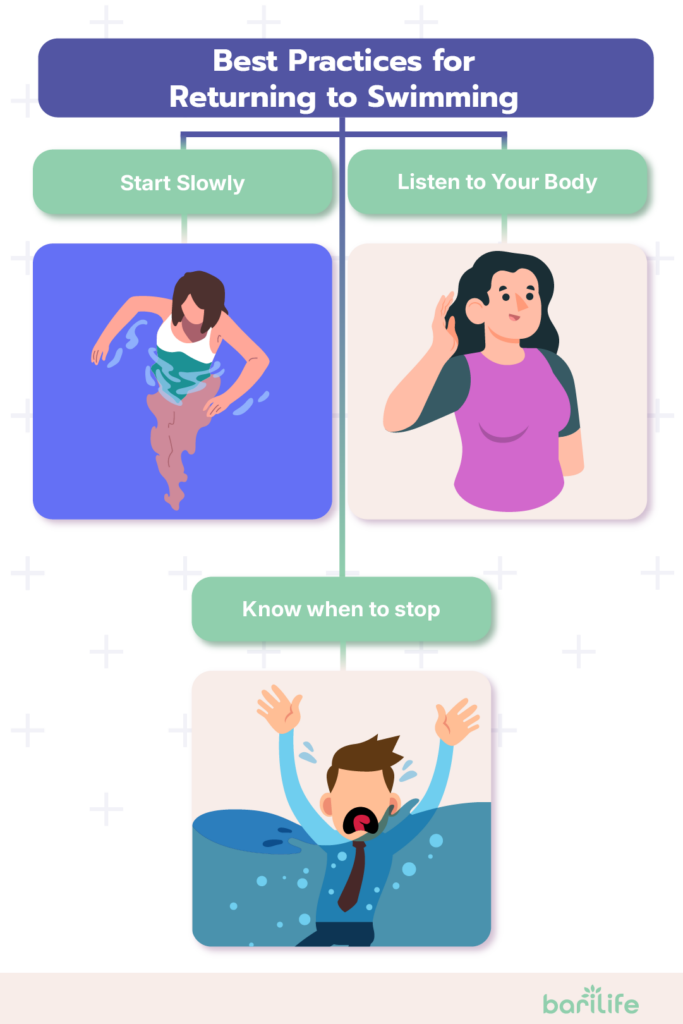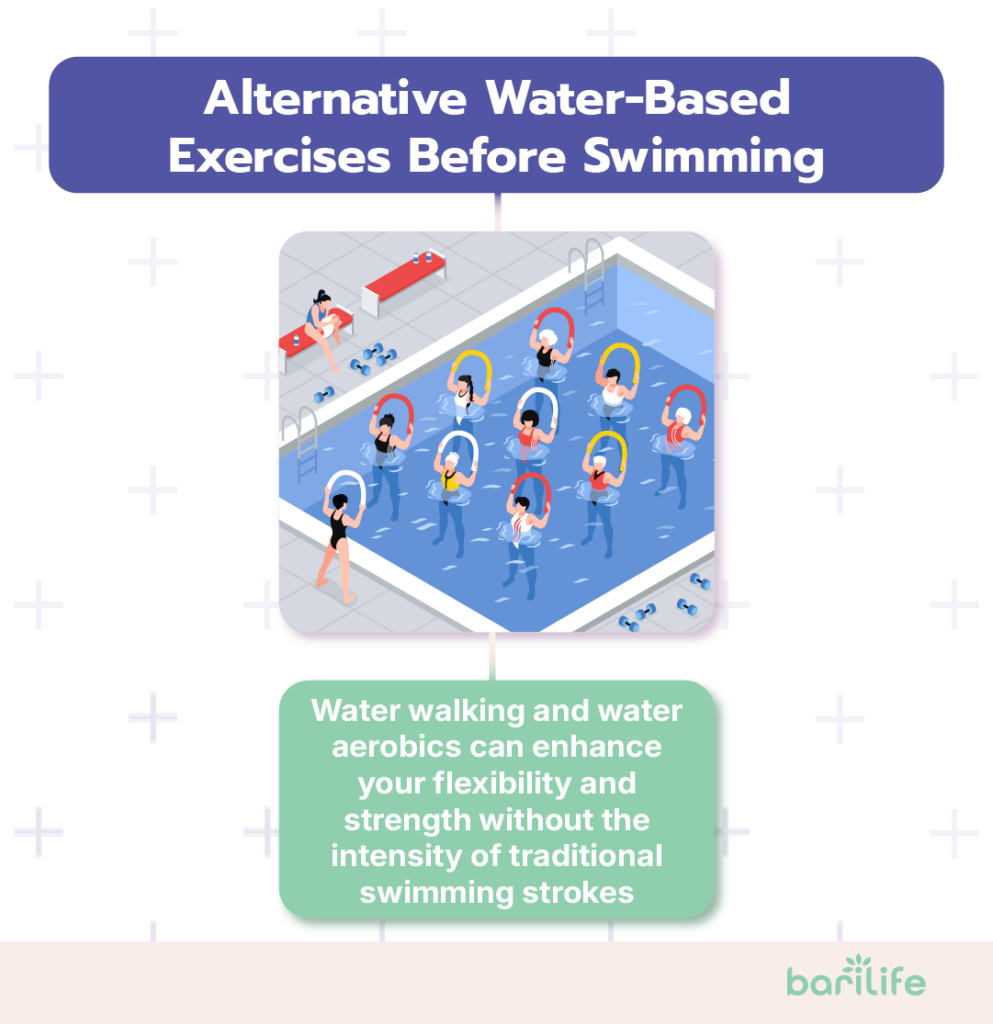Key Takeaways
- Most surgeons recommend waiting two to three weeks after bariatric surgery before swimming, but you must receive medical clearance and ensure your incisions are fully healed to avoid infection and other complications.
- Once cleared, begin with low-impact activities like water walking or light treading before progressing to more strenuous swimming. Listen to your body and build your endurance gradually.
- Entering the water too early can increase the risk of infection, delay incision healing, and divert energy your body needs to recover. Always follow your surgeon's personalized guidance.
People often wonder how long they need to wait before they can swim after having bariatric surgery. This is an excellent question, as swimming is not only a fun activity but is also a low-impact way to get some exercise. This is ideal for those who have just undergone bariatric surgery. Swimming and water aerobics help reduce pressure on the joints and are a gentler way to rebuild fitness.
However, timing is crucial to ensure safety and prevent complications. This article is your comprehensive guide on when you can safely return to the pool or beach after your procedure.
[/box]
General Recovery Timeline After Bariatric Surgery

Before diving into swimming, it's important that you know the general recovery timeline after surgery.
Hospital Stay
Hospital stays after bariatric surgery typically range from two to three days. This depends on the type of procedure and individual patient factors.
Laparoscopic procedures generally require shorter hospital stays than open surgeries.
Return to Work
You can plan on resuming work anywhere from three days to three weeks after surgery, but this depends on the nature of your job and how you recover.
People with desk jobs can return earlier, while those with physically demanding occupations might require more healing time.So if you’re wondering, “how long after bariatric surgery can I go back to work?”, the answer varies but starts around the three-day mark for light.
Diet Progression
After surgery, you’ll transition from clear liquids to solid foods over a period of time. Your surgeon will provide you with a specific timeline, but keep in mind that it can vary by procedure and your recovery.
Most programs follow a structured progression:
- Week 1: Clear liquids
- Weeks 2-3: Full liquids (protein shakes, yogurt, etc.)
- Weeks 4-5: Pureed foods
- Weeks 6-7: Soft foods
- Week 8 and beyond: Regular healthy foods in smaller portions
Physical Activity
It's recommended that you begin physical activities gradually, with timelines ranging from a few days to several weeks, based on individual recovery and the type of surgery performed. While light walking is encouraged almost immediately after surgery, more strenuous activities require more time:
- Days 1-2: Walking around your home
- Week 1: Short, slow walks outside
- Weeks 2-3: Increased walking duration
- Weeks 3-6: Light cardio and resistance exercises
- After 6 weeks: More vigorous exercise (with doctor approval)
Swimming After Bariatric Surgery: Specific Guidelines
Most surgeons recommend waiting two to three weeks before swimming in pools, lakes, or oceans. However, this timeline can differ based on several factors.
Incision Healing

To prevent infections, all surgical incisions must be fully healed before submerging them in water. During this phase of bariatric surgery recovery time, your incisions are still vulnerable to bacteria that might be present in swimming pools, tubs, or natural bodies of water. That's why doctors advise waiting at least a few weeks before taking a dip.
Signs your incisions have healed sufficiently:
- No open areas or drainage
- Scabs have fallen off naturally
- No redness or swelling around the incision sites
- Minimal tenderness when touching the area
Medical Clearance
Always consult with your healthcare provider before swimming. That way, you can get personalized advice according to your recovery status. Your doctor knows your situation and can provide guidance based on your healing progress.
Some surgeons might be more conservative and recommend that you wait several weeks, while others might clear you for swimming as early as two weeks post-surgery if your incisions are healing well.
Best Practices for Returning to Swimming
Once you get clearance from your doctor, make sure to follow these best practices for a safe return to the water.
Start Slowly
Begin with gentle water activities like walking in the pool before moving to more strenuous swimming routines. Water walking provides many benefits of swimming with even less stress on your body.
A sample progression might look like:
- Walking in waist-deep water for 10-15 minutes
- Light treading water or floating with support
- Slow, gentle swimming for short distances
- Gradually increasing duration and intensity
Listen to Your Body
Pay attention to any discomfort or fatigue and adjust your activity level accordingly. After bariatric surgery, your energy levels and endurance will not be the same as before, so be patient and know that your fitness will build up over time.
Some normal sensations during initial swimming sessions include:

- Mild fatigue
- Some muscle soreness
- Slightly increased breathing rate
However, stop immediately if you experience:
- Pain around incision sites
- Dizziness or lightheadedness
- Unusual shortness of breath
- Nausea or vomiting
Risks of Swimming Too Soon
You face potential risks if you ignore your doctor's recommended wait time for swimming.
Infection
Swimming in pools or other bodies of water before your incisions have adequately healed can increase the risk of infection. Even well-maintained pools contain bacteria that can enter healing wounds and cause complications.
While chlorine in pools kills many germs, it doesn't totally eliminate all infection risks. Natural bodies of water can have an even higher risk of bacterial contamination, so avoid lakes, rivers, and oceans in the meantime.
Delayed Healing
Premature swimming may interfere with the natural healing process, leading to complications or prolonged recovery. The moisture and pressure from swimming affect how your incisions close and may cause them to reopen if you start too early.
Additionally, the physical exertion in swimming might divert the energy that your body needs for healing. During the early recovery phase, you need to focus on healing internally from the surgical changes to your digestive system.
Alternative Water-Based Exercises Before Swimming
If you're eager to get into the water but haven't reached the recommended timeframe for swimming, consider these alternatives. As always, you need physician approval to ensure safety and avoid complications.
Water Walking
Doing walking exercises in shallow water, such as a toddler pool, can provide cardiovascular benefits while minimizing joint stress. This activity keeps your incisions above water level while giving you slight resistance from the water, which is great for your muscles.
Aqua Aerobics

Participating in low-impact water aerobics classes can enhance your flexibility and strength without the intensity of traditional swimming strokes. Many community pools offer specialized aqua classes designed for rehabilitation or beginners. Look for classes labeled as "gentle," "beginner," or "rehabilitative" rather than high-intensity ones. Make sure you stay where it’s shallow and your incision remains above the water.
Additional Tips for Safe Swimming Post-Surgery
Once you've been cleared to swim by your healthcare provider, these additional tips will help ensure your water activities remain safe and beneficial.
Hydration
Make sure you are properly hydrated since water activities can sometimes mask signs of dehydration. However, post-surgery, you need to be mindful about how much you can drink at one time. Sip water before and after swimming, and take regular breaks during your swim session to drink small amounts.
Swimwear
Avoid swimwear that rubs against your surgical wounds. For women, one-piece suits might be more comfortable than bikinis. For men, swim trunks with a swim shirt may be comfortable and protective.
Monitor Intensity
Avoid high-intensity swimming sessions in the beginning. You can gradually increase the length and intensity based on your comfort and endurance levels. A good rule of thumb is to start with sessions half as long as you think you can handle, then gradually build up.
Remember that swimming involves different muscle groups than other forms of exercise, so it might feel more challenging at first, even if you're progressing well with walking or other activities.
Conclusion
While the general guideline is two to three weeks, the exact timeline depends on your healing process and your surgeon's recommendations. The most critical factors are ensuring your incisions have fully healed and receiving the signal from your healthcare provider.

Swimming can be a great form of exercise after bariatric surgery. By following the guidelines in this article and working with your doctor, you can return to enjoying the water safely while supporting your weight loss and fitness goals.
How Bari Life Can Help
Recovering from bariatric surgery isn’t just about healing—it’s about thriving. Bari Life is here to support you every step of the way with high-quality, bariatric vitamins, supplements, and nutrition products designed to help your body recover and reach its full potential. Whether you need bariatric multivitamins, a liquid bariatric vitamin, or bariatric vitamins chewable, we have tailored options to fit your specific needs.
Whether you're getting back into exercise, improving your hydration, or rebuilding strength, our easy-to-digest formulas and comprehensive support options make your journey smoother. Our full selection includes bariatric protein shakes and bariatric protein bars to help you fuel your body post-op, as well as bariatric calcium chews and bariatric multivitamin with iron to support bone health and energy levels.
We also understand that the journey includes caring for your appearance and digestive wellness. That’s why we offer targeted options like bariatric vitamins for hair loss and bariatric probiotic support to help you feel your best inside and out. Need a boost between meals? Try our delicious and convenient bariatric snacks to stay satisfied and on track.
Check out our full line of nutritional essentials today and feel confident diving into your healthiest life yet!
If you want to learn more, why not check out these articles below:
- Why Are You Not Allowed To Use a Straw after Bariatric Surgery?
- How Long After Bariatric Surgery Can I Drive?
- How Long After Bariatric Surgery Can You Have Sex?
- Vaping after Bariatric Surgery
- Post Bariatric Surgery

Leave a Comment
Your email address will not be published.